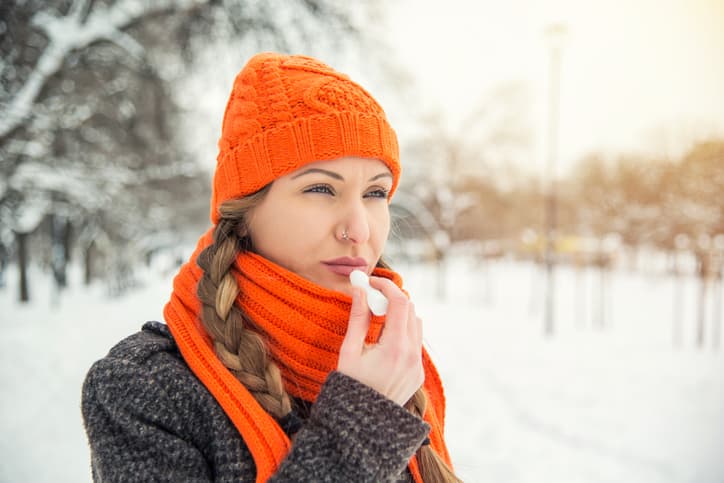
Chapped Lips
Exposure to wind, cold and sun creates the perfect environment for dry lips. Simple exposure to the elements can damage the delicate skin on your lips, so keep them protected. Wear a daily lip balm that contains at least SPF 15 and apply it often. You can also stave off chapped lips by drinking plenty of water to hydrate your skin, and installing a humidifier in your home to add a little extra moisture when you sleep.
If you already have chapped lips, keep them super hydrated so they heal faster.
Canker Sores
If you notice that you have more canker sores than usual, it might be the result of indulging in your favourite winter treats. Mayo Clinic notes that foods high in acid can be a recipe for canker sores, so if you’ve been sipping on cider or noshing on spicy treats during the holidays, canker sores can actually set in and ruin your fun.
Of course, completely avoiding acidic and spicy foods can help prevent canker sores, but if you’re already suffering, try swishing a mixture of one teaspoon of salt and a half-cup of water to help clean the sores for faster healing. Alcohol-free solutions such as can also be used to help relieve pain and may speed the healing process without irritating sensitive mouths.
Cold Sores
Exposure to the harsh winter sun can also cause cold sore breakouts. Spending time outside during the winter can definitely exacerbate cold sores at the worst time possible.
When battling cold sores, the best winter tips for a healthy mouth ensure that the skin around your mouth is protected. Continue to use products with SPF of 15 or higher. Try to keep your hands clean as well, in order to avoid the spread of viral bacteria.
Sensitivity
That surge of pain you feel when biting into cold foods might seem to be ever-present during the cold winter months. Cold temperatures and wind could leave your teeth feeling sore, even when you take measures to avoid foods that have these abrasive qualities. Brushing with a desensitizing toothpaste may keep this irritation suppressed all winter long. Sensitive toothpaste use ingredients that protect the teeth from sensitivity to extreme temperatures.
Winter should be about celebrating with family, taking advantage of winter sports and enjoying the opportunity to keep warm by the fire – not worrying about oral health. By knowing which mouth woes are most likely to affect you during the colder weather, you can prevent them from derailing your good time.
